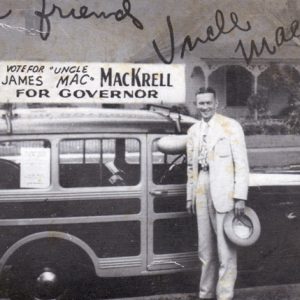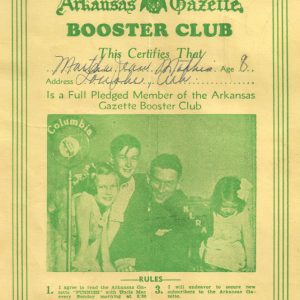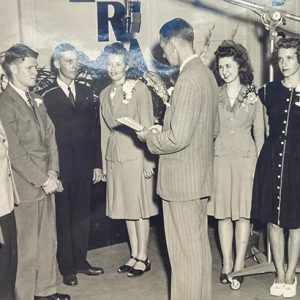calsfoundation@cals.org
James "Uncle Mac" MacKrell (1902–1972)
James “Uncle Mac” MacKrell made a name for himself in Arkansas, first through radio and then through politics. Known as “Uncle Mac” to his adolescent radio audience and as a radio evangelical to others, he is perhaps most remembered for his two campaigns for governor of Arkansas, in 1948 and in 1970.
James MacKrell was born in Houston, Texas, on August 8, 1902. He lived in Texas until 1929, and there he attended primary and secondary schools as well as Southern Methodist University in Dallas. After moving to Arkansas in 1929, MacKrell began his career in radio in Fayetteville (Washington County). In 1930, he moved to Little Rock (Pulaski County) and accepted a job at KLRA. In 1934, MacKrell began a Sunday morning radio show in which he read the Sunday morning comics to the children of central Arkansas. He began referring to himself as “Uncle Mac,” a name that stuck with him throughout his career in Arkansas. MacKrell remained a strong presence at KLRA from 1930 to 1950, a period during which he held several positions at the radio station, but he was most well known for the evangelical program he started in 1938 called Bible Lover’s Revival. It remained on air for ten years.
Besides radio, MacKrell was active in service projects. Shortly after moving to Arkansas, he founded Arkansas Academy, an orphanage originally established in Arlberg (Stone County) but later relocated to Mabelvale (Pulaski County) after irreparable flood damage in the late 1930s. MacKrell raised support for the orphanage by singing in a quartet and preaching from a stump. At these meetings, he began passing around a milk bucket to collect donations.
Some time after moving to Arkansas, MacKrell married Bess Irene Townsend of Conway (Faulkner County). They had four children including James MacKrell Jr., who went by Jim McKrell and also became a broadcast personality.
In 1944, MacKrell took his first active step in Arkansas politics by working for Colonel Thomas Harry Barton in his senatorial campaign against Bill Fulbright. The race ended with Fulbright being elected to his first term in the U.S. Senate, but MacKrell soon found another cause to support. In 1946, he began a campaign against an act for school consolidation; the act was defeated, largely due to his active role against the legislation.
In 1948, MacKrell increased his recognition in the state by running for governor in the Democratic primary. He came in third in the primary behind Sidney McMath and Jack Holt Sr. After his defeat, he threw all his support behind Holt in the runoff election, campaigning for him by preaching from a stump and collecting donations in a milk bucket. Despite MacKrell’s support, Holt lost the election to McMath by some 30,000 votes.
Two years later, in 1950, MacKrell ran for lieutenant governor of Arkansas. He came in second to Nathan Gordon in an eleven-man race, again using his familiar tactics. This time, his involvement in politics proved to be fatal to his other projects. His “pass the bucket” approach branded him as a “professional beggar,” which caused bad publicity for his service projects, particularly the orphanage in Mabelvale. It was forced to close due to lack of funds and was handed over to what was then the state Department of Welfare (now the Arkansas Department of Human Services).
With his failure in the lieutenant governor election and the loss of the orphanage, MacKrell left Arkansas for sixteen years to pursue other affairs. In 1950, he took a job in public relations for the Petrolane Oil Company in New Orleans, Louisiana. There, he established himself to the public of Louisiana, again through the means of radio, and became known as “Colonel Petrolane.” After about nine years, MacKrell moved again, this time to Arlington, Texas, where he became the executive director of a cooperative company that built and financed churches. He was part of the company for seven years, during which time fifty-nine churches were established.
After sixteen years away from Arkansas, MacKrell returned in 1966 and established his own church in North Little Rock (Pulaski County). Called East Side Baptist Church, it was located at 2922 E. Second Street. From there, MacKrell began to distribute food commodities to the poor through a federal-state welfare program. Food distribution was carried out for a short while before the city planners ordered the program shut down due to illegal use of a storage building as the distribution center.
In 1970, MacKrell decided to run for governor once again. This time, however, he ran on the Republican ticket against Governor Winthrop Rockefeller, insisting that the Democratic Party was not the one he remembered from twenty-two years before. Just as he had in 1948, MacKrell used familiar campaign tactics and passed the milk bucket around, asking for one-dollar donations. This remained an effective way for him to finance his campaign and proved that he still had a few followers in Arkansas. However, he did not come remotely close to beating the incumbent Rockefeller in the primaries, and the race was his final attempt at public office.
After the election, MacKrell returned to radio. He began hosting a radio show called Party Line on KVEE in Conway. On February 27, 1972, while interviewing a group of teenagers during his nightly radio show, MacKrell suffered a heart attack and died.
For additional information:
James K. MacKrell Papers. University of Central Arkansas Archives and Special Collections, Conway, Arkansas.
Sallee, Bob. “‘Uncle Mac’: Renaissance Man with Arkansas Roots.” Arkansas Democrat-Gazette. March 11, 1997, p. 4E.
Kayla Kesterson
University of Central Arkansas
 James MacKrell
James MacKrell  "Uncle Mac" Certificate
"Uncle Mac" Certificate  "Uncle Mac" Performing Wedding
"Uncle Mac" Performing Wedding 




Comments
No comments on this entry yet.